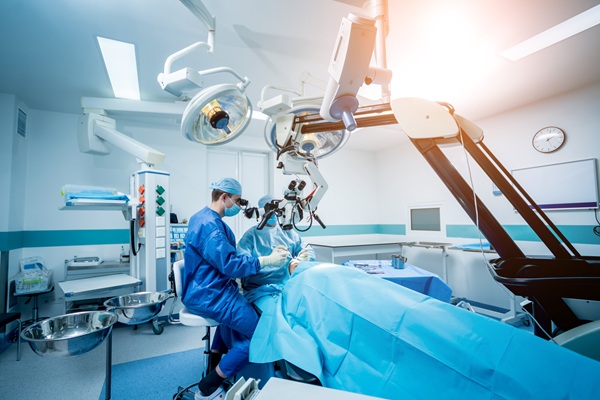Brain surgery is a complex and delicate procedure. It requires strict aftercare to ensure optimal recovery and few complications. Following the advice of your brain surgeon can help aid your healing process and make your long-term treatment a success. Here are some general tips from {{DOCTORNAME}} to help patients and their caregivers through this important post-surgery period.
Follow all post-operative instructions
Each surgical procedure is different, with every patient needing a personalized aftercare routine. It is important to follow all of one's post-operative instructions provided by the Dr. William G. Loudon, Pediatric Neurosurgery team. This plan may include filling and taking any prescribed medications or antibiotics, attending follow-up appointments, and following specific activity restrictions. These instructions are essential to a smooth recovery and can help minimize complications like post-operative infection, particularly in the first few days after the procedure.
Managing pain and discomfort
Post-surgical pain is common, typically manifesting as a headache. However, it should never be unmanageable. Patients should use prescribed medications as directed. Over-the-counter medications may also be recommended for less invasive brain surgeries, but it is important to consult the brain surgeon before taking any additional medication.
Additionally, patients should report any severe or persistent pain to their provider as soon as possible. These side effects may indicate complications and need to be examined and treated to prevent further issues.
Be aware of the signs of infection
Similar to pain, infection is a risk after any brain surgery. Follow post-operative instructions to care for the surgical site. Generally, these instructions will include keeping the surgical site clean and dry. Patients and caregivers should monitor for signs of infection. These signs include:
- Redness
- Swelling
- Warm incision site
- Increased pain
- Discharge or pus coming from the incision site
- High fever
- Nausea or vomiting
- Stiff neck
- Sensitivity to light
Infection after a brain surgery is considered a medical emergency. Prompt medical attention can help prevent severe health issues.
Get plenty of rest
Quality sleep is crucial for brain health. Take the following steps to promote good sleep habits:
- Setting a regular sleep schedule
- Relaxing before bed, such as reading or meditating
- Ensuring the bedroom is quiet, dark, and at a comfortable temperature
- Limit screen time before bed, which can strain the eyes and brain
Gradually resume physical activities
While getting plenty of rest is vital for recovery, complete inactivity after brain surgery is not recommended by brain surgeons. Light activities, such as short walks, can promote circulation and prevent post-operative complications like blood clots. However, the patient should avoid strenuous activities and heavy lifting until the brain surgeon provides the necessary clearance. Gradually increasing activity levels under medical supervision can help rebuild one's physical strength and endurance.
Additionally, exercise the brain. Activities like puzzles, reading, and listening to music can help the brain recover after brain surgery. These cognitive exercises will vary from patient to patient and will depend on what they feel up to doing.
Maintain a healthy diet
A balanced diet rich in nutrients supports the healing process. Many brain surgeons recommend incorporating plenty of fruits, vegetables, lean proteins, and whole grains into the patient's diet. Avoid foods that promote inflammation, such as red and processed meat, foods high in fat, and foods with artificial sugar.
Have patience
The brain takes a long time to fully recuperate. After brain surgery, some patients may feel more angry or irritable, while others may feel nervous. It may take a few weeks or even months to feel normal again. However, it is important to remember that this is normal and expected. Be patient, accept help when needed, and allow the body to heal in its own time.
Call our office for more tips
We hope that these tips can help you navigate the post-surgery period. Do you have questions or concerns? Call our office for more tips or to schedule a follow-up appointment.
Request an appointment here: https://www.drloudonpediatricneurosurgery.com or call Dr. William G. Loudon, Pediatric Neurosurgery at (714) 677-9463 for an appointment in our Orange office.
Check out what others are saying about our services on Yelp: Brain Surgeon in Orange, CA.
Related Posts
Exploring Options in Pediatric Brain Tumor Treatment
Pediatric brain tumor treatment is a highly specialized field that requires a multidisciplinary approach to ensure the best possible outcomes. Brain tumors are among the most common solid tumors in children, and …
FAQs About Hydrocephalus Treatment
Hydrocephalus affects people of all ages. Whether you are a parent concerned about your infant or are an adult with this condition, you likely have questions about hydrocephalus treatment. There are a …
How Minimally Invasive Neurosurgery Reduces Recovery Time
Minimally invasive neurosurgery brings minimal recovery time, improves comfort, and lowers risks associated with traditional procedures. With techniques like smaller incisions, faster healing, and precise interventions, these advanced methods provide effective treatment …
What to Expect from a Consultation with a Brain Surgeon
If you have been referred to a brain surgeon, you may feel nervous or confused about what to expect during the consultation. This initial meeting is essential, as it sets the expectations …


